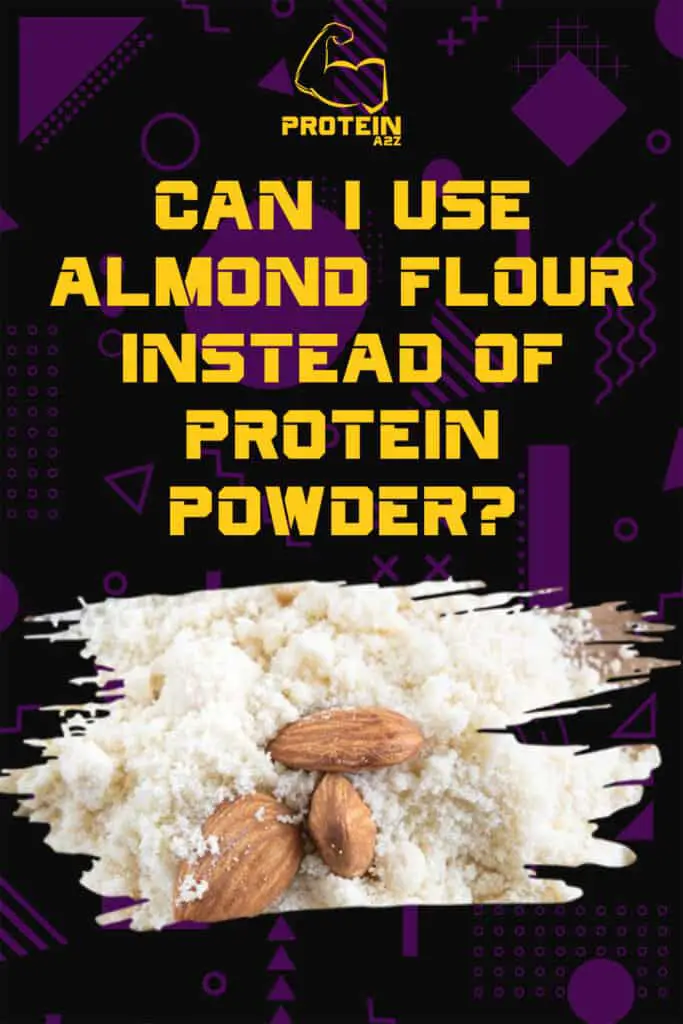We are all looking for a way to make our favorite snacks just a little bit healthier. Using protein powder to replace all-purpose flour has become a widespread practice among home chefs as a way to up their protein intake and make their treats a little bit healthier.
This has led some people to wonder if they can replace protein powder with almond powder.
Table of Contents
Ratios for replacement
Let’s first look at ratios for replacing all-purpose flour with almond flour or protein powder. A general rule is to replace no more than 1/3 of the regular flour with protein powder. And for every ½ cup of regular flour, you should use 1/3 cup or protein powder.
For almond flour, you can use a 1:1 ratio. However, you will need to add 1/8 teaspoon of baking soda and 1/8 teaspoon of baking powder to help with rising.
Let’s say that a recipe calls for 1.5 cups of flour, you could use 1/3 cup of protein (1/3 of total flour), 1 cup of almond flour, ¼ tsp baking soda, and ¼ tsp baking powder.
What is almond four?
It is important to note the almond flour isn’t actually “flour” compared to your other more traditional flours. This means it behaves differently, making it a little bit trickier to bake with. Therefore, before you start using it as a substitute for protein powder, try just using it on its own or with traditional flour to see how it behaves.
You can then experiment with flour, almond flour, and protein powder. Once you have a better feeling for using almond flour, you can then use it to substitute protein powder. When you get to that point, use the same ratio as mentioned above: 1/2 cup of almond flour for 1/3 cup of protein powder.
Replacing protein powder
Suppose your recipe is only using protein powder on its own. In that case, you can go ahead and just use almond flour to simply replace it without the baking soda or baking powder. Remember, almond flour is really just grounded up almonds and doesn’t have the same baking properties as flour. Be mindful of the above conversions and start by only replacing smaller amounts to see how it behaves.
Using alternatives for ingredients in the kitchen are becoming more popular and everyday people are discovering new recipes. You may want to try a proven recipe first before venturing on your own. Either way, make sure you keep notes about what you do as well as the final results so that you can alter anything with the next batch. Plus, you can learn how changing variables can alter foods.
- Is it a good idea to add protein powder to hot milk
- This is what you can add protein powder to
- Best protein powder for baking
FAQs about almond flour
What is the difference with almond flour and almond meal?
Almond flour and almond meal are very similar in that they are both ground up almonds. The main difference is that almond flour is first blanched in boiling water and the skin is removed before the almonds are ground up. Almond meal is ground up with the skin intact. This gives almond meal a much coarser texture.
What are the health benefits of almond flour?
Almond flour is extremely nutritious. One ounce contains 163 calories and 6.1 grams of protein. It has a wide range of minerals including manganese and magnesium and is especially high in Vitamin E.
What are other alternatives to almond flour?
Using other nut flours like cashew flour is your best choice as most will behave similarly when being used for baking. You can also try pumpkin seed or sunflower seed flour. Cassava flour and coconut flour are good choices too.

User comment about using almond flour
Are You Using Almond Flour Instead of Protein Powder?
Some people are concerned about using almond flour instead of protein powder and others wonder if there is a difference. The truth of the matter is that there really isn’t much difference between the two. Protein powder is primarily made up of soy and corn.
Although the amount of protein may vary depending on what you are using, most of the powder is soy or corn. What the body needs when making a protein shake, meal, or even a snack is the protein that comes from proteins found in meat, eggs, and dairy products.
What your body needs when building muscle and losing fat is the proteins contained in plant-based foods such as nuts, seeds, and soy. If your body is not getting enough protein, it will have a difficult time rebuilding muscle after a workout and burning fat.
Large amount of protein
It is also important to note that many athletes believe that they need to eat a large amount of protein and often feel hungry after training because they aren’t getting enough protein in their diet. That being said, the protein shakes and other sports drinks that athletes drink in order to stay pumped up, can actually cause more harm than good.
If you want to have a better chance of staying healthy, it is recommended that you eat a good protein shake or another food source of protein.
There is no reason for you to use almond flour instead of protein powder. While there may be some slight differences in the taste and the texture, they really don’t affect your body’s ability to produce the protein that it needs.
In fact, the only way that you would notice a difference in the taste is if you put a little bit of it in a smoothie for breakfast or something. You won’t notice much difference with protein powder in any of the foods that you consume as long as you are getting the essential protein that your body needs.

